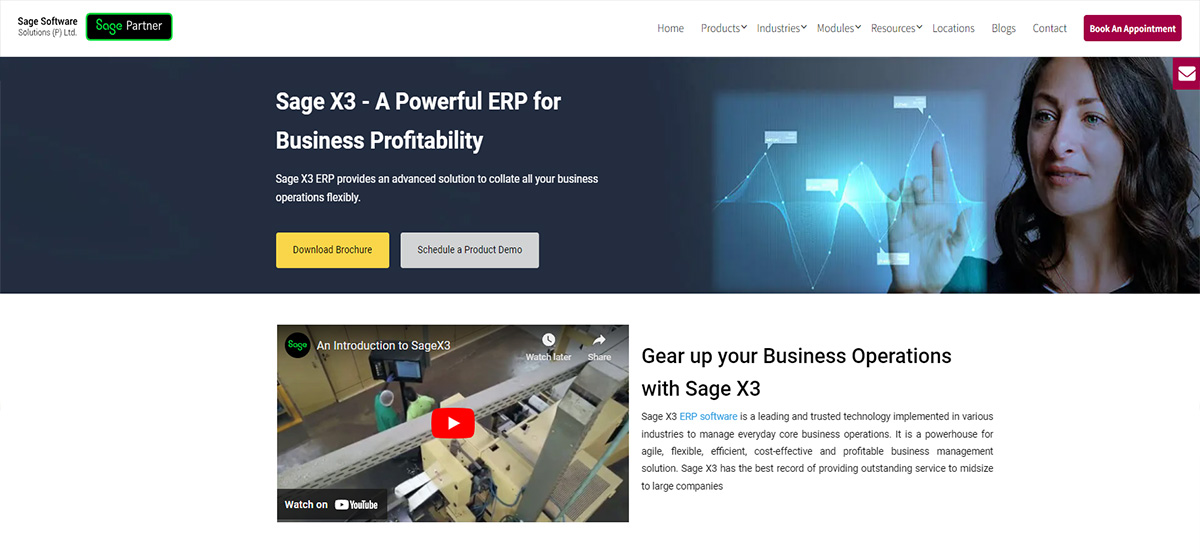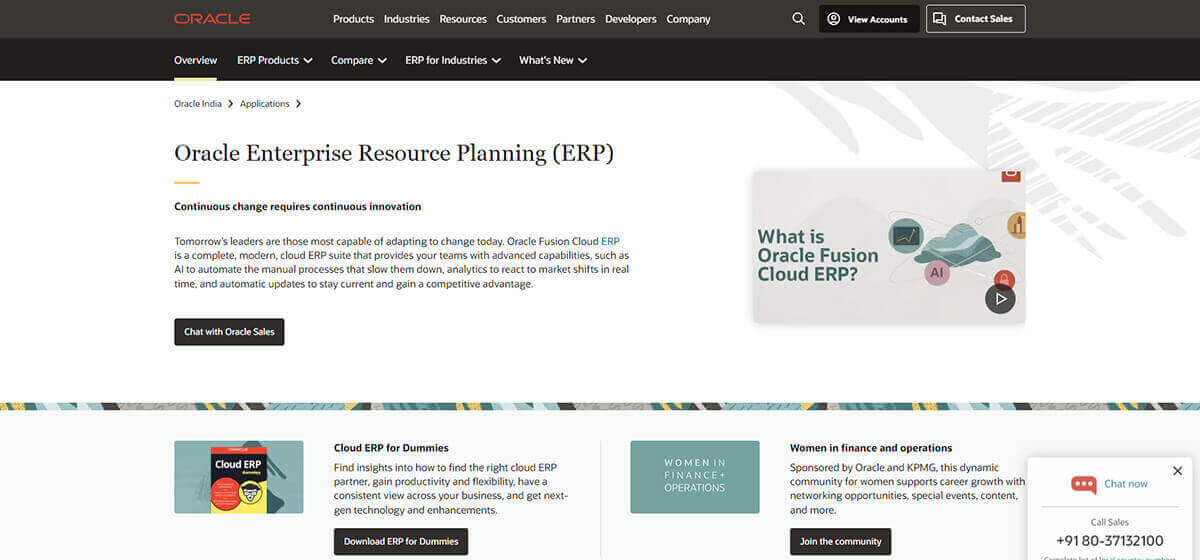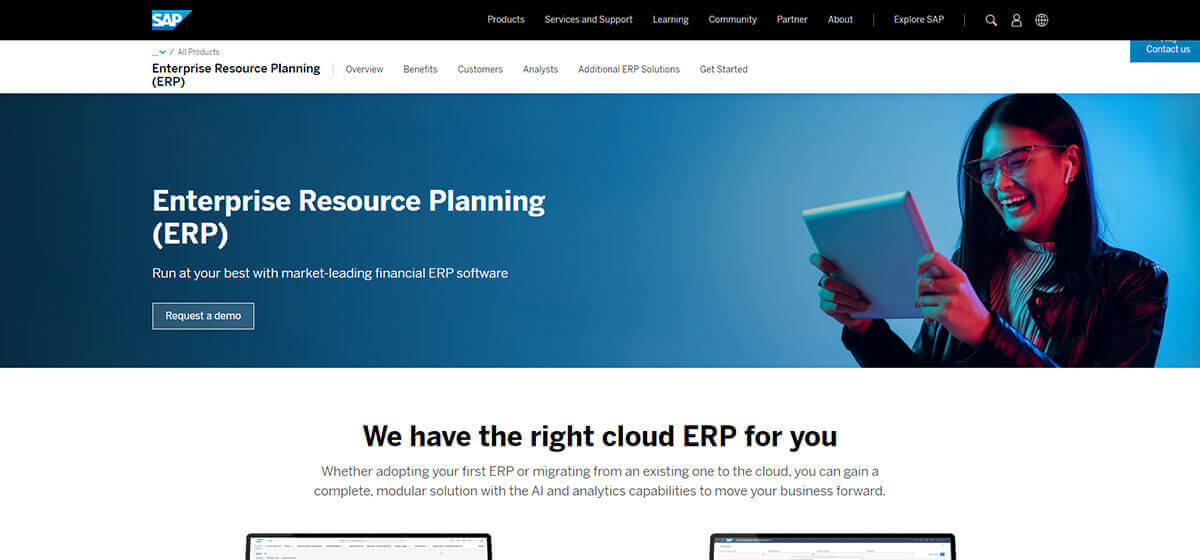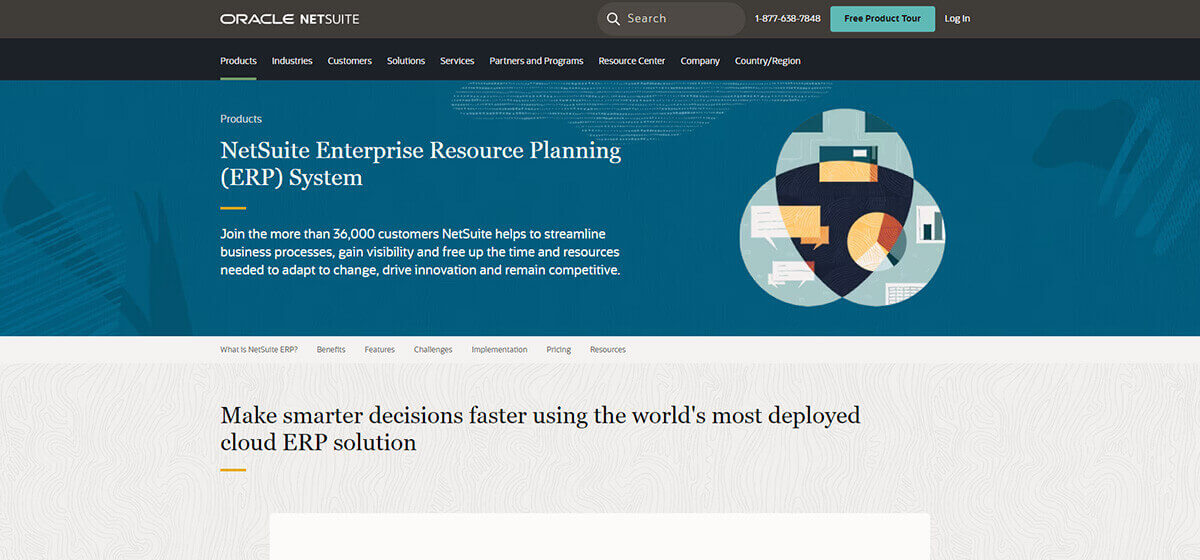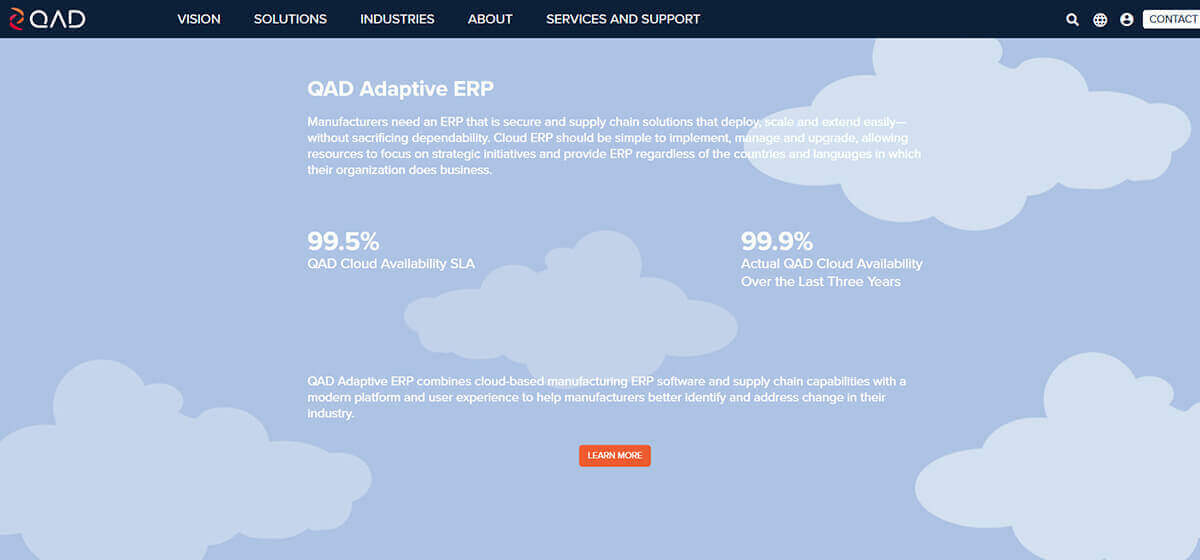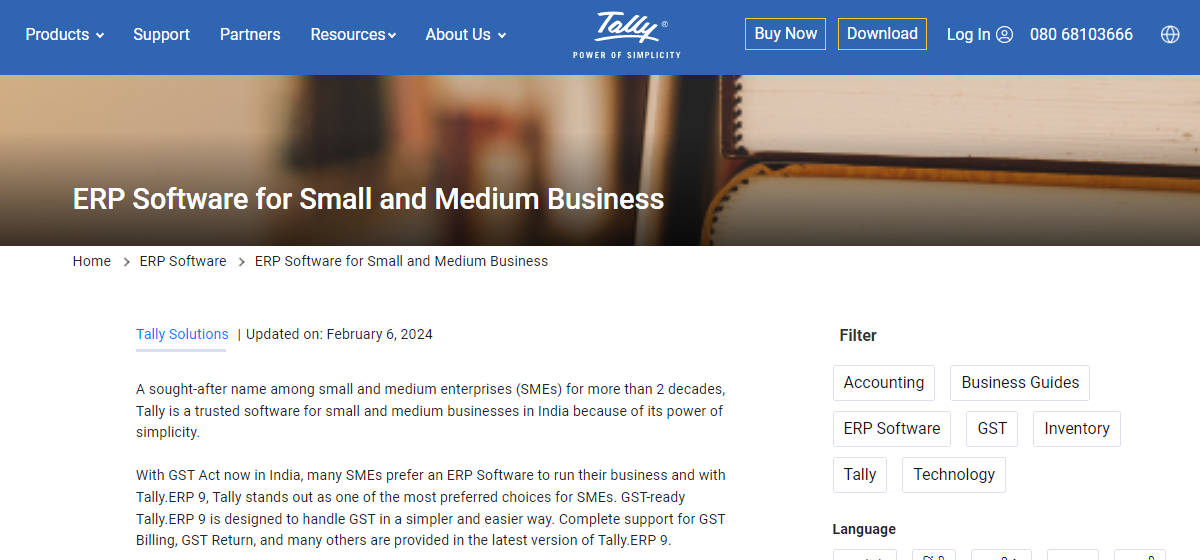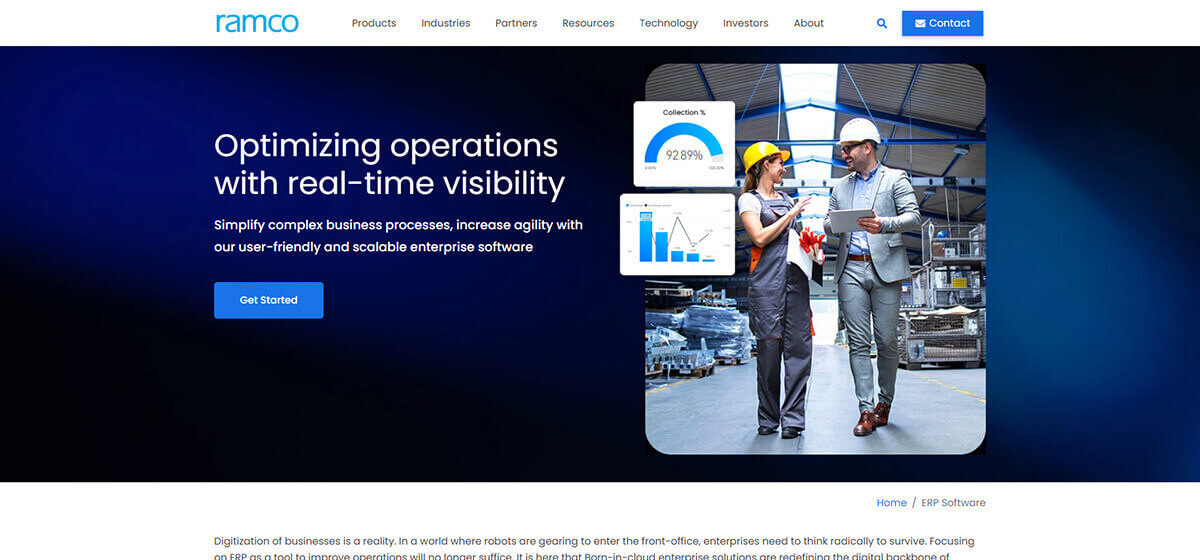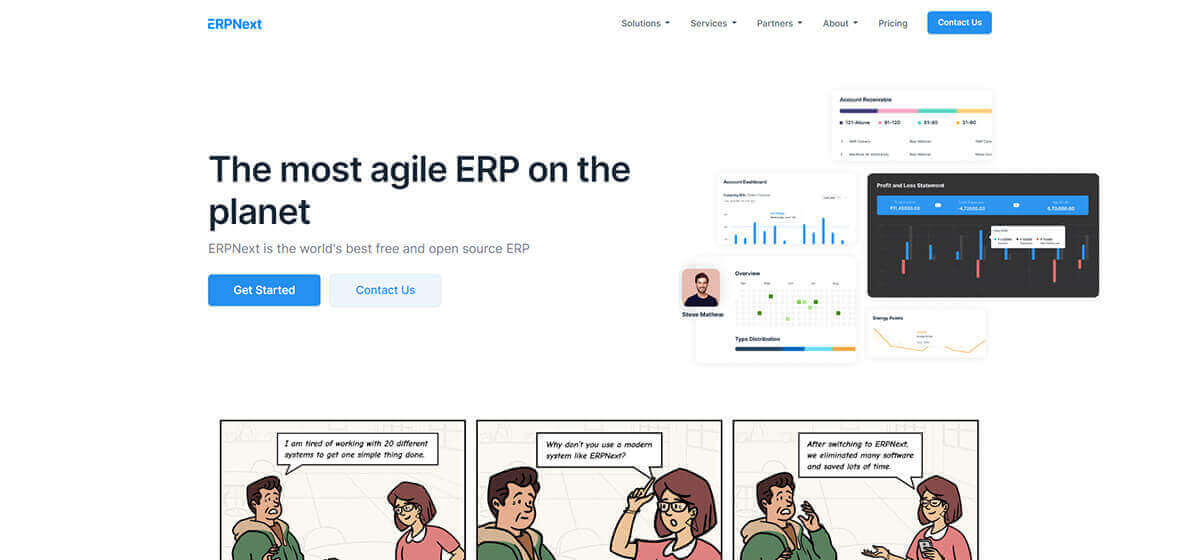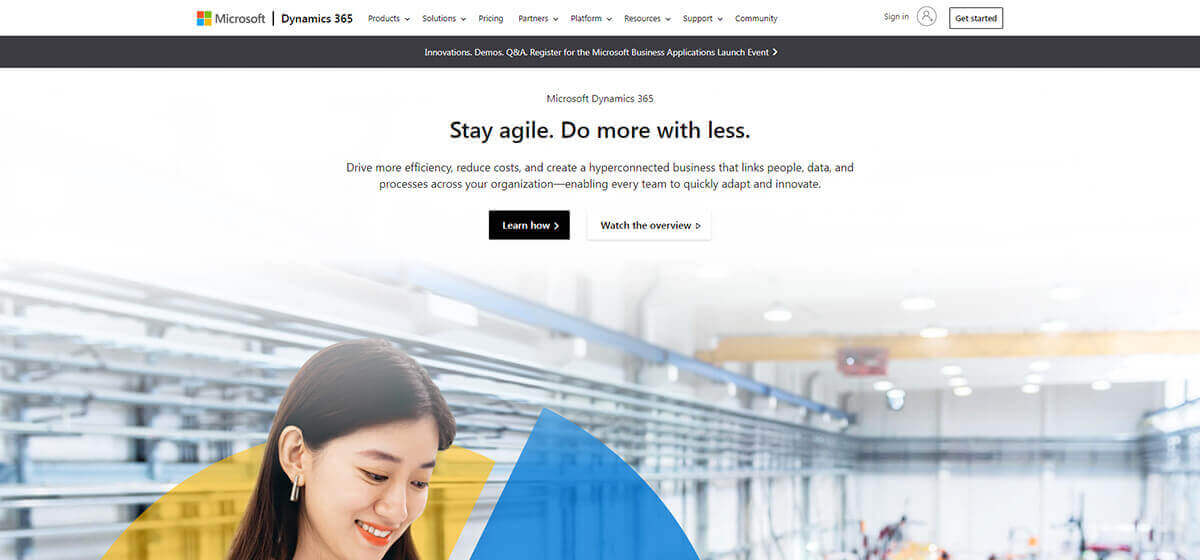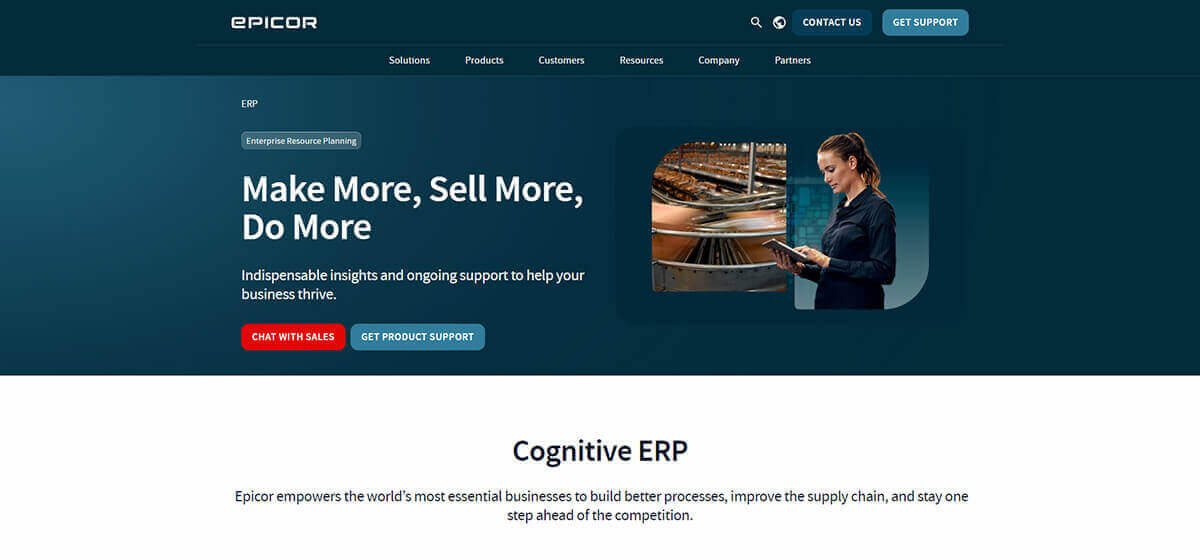Best ERP Software in India 2025
Find the perfect ERP software for your business among the top 10 ERP solution providers in India.
In today’s highly complex and fast-paced business landscape, it’s crucial for businesses to operate efficiently and respond quickly to changing market dynamics. In order for this to happen, they need a highly efficient system that takes care of their everyday business needs.
An increasing number of businesses across the world, especially manufacturers, are leveraging modern technological solutions, such as ERP software. This helps them gain operational excellence, and bring digital transformation. It offers deep integration with legacy tools and support for modern technologies such as the cloud. Let’s deep dive into the best ERP software in India so that you can make a confident & informed decision.
10 Best ERP Software in India to Elevate Your Business Performance
- Sage X3 ERP for outpacing competitors with deep analytical insights
- Oracle Cloud ERP for gaining agility and scalability
- SAP ERP for fast-growing businesses
- NetSuite ERP for special focus on adaptability
- QAD Adaptive ERP for strong supply chain planning
- Tally.ERP for robust financial capabilities
- Ramco ERP for a mobile-first approach
- ERPNext for cost-effectiveness
- Microsoft Dynamics 365 for special focus on sales & finance
- Epicor ERP for a focus on user experience
ERP (Enterprise Resource Planning) software is a comprehensive suite of industry-focused modules that automates core business operations and provides a single source of truth for quick & informed decision-making. It has become the backbone of modern-day businesses across varying sizes and industries.
ERP software integrates different business functions, automates labor-intensive operations, and provides strategic insights, thus providing substantial benefits in the long term. This Business Management Software allows companies to maintain quality & consistency, maximize efficiency, and improve forecasting accuracy. It offers different deployment options, such as on-premise, cloud, and hybrid, to suit the specific needs of each business.
Overview of the Indian ERP Software Market
India has seen an exceptional increase in the adoption of the ERP Application. According to a report by Statista, the Indian Enterprise Resource Planning market is expected to reach $815 million by the end of the current year, 2025.
India has seen an exceptional increase in the adoption of the ERP Application. In 2020, the Indian ERP market share was valued at $375.2 Million. It is expected to witness tremendous growth and reach around $576.2 Million by 2027.
The Indian ERP market is primarily dominated by manufacturing, pharma, food, chemical, automotive, oil, pharma, steel, and textile companies. In recent years, cement, construction, and power companies have also been adopting the ERP solution for their businesses.
Why is ERP software important for modern businesses? Does its significance far outweighs the initial cost? Let us discuss some of its important benefits in the modern business landscape.
Business Intelligence
An ERP software contains multiple modules such as product management, customer support, human resource, inventory management, quality assessment, sales, etc. The core principle behind ERP systems is a centralised database with all departmental information. It provides key decision makers real-time access to company-wide data.
Easier Data Accessibility
The best ERP software allows decision makers to analyse data from any department, at any time, from any location, and using any device. The ease of accessing and updating data ensures quick decision making and higher efficiency in business operations.
Improved Team Collaboration
The centralised database in the Enterprise Resource Planning software allows employees of all departments to work together in coordination with access to the most accurate, real-time and authentic data. Teams can work in real-time and share bi tools data securely.
Enhanced Business Reporting
ERP software gives detailed insight into organisational functions in various customizable dashboards. This visibility across all departments allows decision makers to get insights into valuable company data. They can also generate detailed reports whenever they want.
Easier Compliance
As an organisation establishes its offices in different countries, it is required to adhere to local laws, regulations of that country. ERP software in India helps the organisation to maintain compliance at every stage — environmental, human resource, financial management, accounting and taxation, just to name a few.
Better, Timely & Accurate Customer Service
The best ERP software can help provide timely customer service by reducing the delays in the delivery of the products. It can modernise backend processes, and streamline shipping operations. Moreover, it provides easy access to the information needed to better serve customers. Customers will experience lesser wait times, and quick resolutions to their queries. ERP software make customer relationship management easier and quicker for businesses.
Fixed Asset Management
Fixed assets are the assets purchased for a long-term such as land, buildings, office premises, furniture, fixtures, machineries, vehicles, office equipment, etc. The best ERP software can help register, track, monitor, classify, tag, maintain and depreciate various fixed assets owned by the business.
Cost Efficient Procurement Process
Procurement software helps reduce procurement costs, makes the procurement process cost efficient, transparent, and fully traceable.
Identify & Reduce Manufacturing Defects
ERP solution keeps a log of all production data, performs quality assessment checks, and notifies the production team about potential malfunctions. It helps reduce customer dissatisfaction, refund or replacement costs.
Higher Moral
ERP software provides a variety of features to optimise factory and warehouse layouts. As a result, wear & tears, accidental injuries, deaths, are significantly reduced. Ultimately, it results in higher morale among the employees.
Remote Workforce Management
The 2020 Covid crisis changed the way we worked. It made "Work from Home" as the new working trend. The small accounting software used by businesses didn't have the features to update the books of accounts remotely. ERP software provides remote workforce management tools and the ability to remotely update books of accounts.
The Need for Cloud ERP Software in India for MSME Market
A cloud-based ERP solution can be a viable solution for many Micro, Small and Medium Enterprises (MSMEs). It can streamline their processes, reduce the chances of errors, and thereby, save costs and bring back lost efficiency.
Cloud ERP can also help Indian MSMEs to comply with complex government regulations by providing automated data insights. Unlike legacy ERP solutions, it is an affordable solution with no upfront costs or any need for hardware upgradation.
Before we discuss the best ERP software in India, let’s discuss the challenges faced during its implementation in India. ERP implementation can be an intensive process. It may require hefty budget, careful planning and co-ordinations between teams.
Here are some challenges faced during its implementation in India:
⇒ Higher Costs
Many businesses, especially MSMEs in India, are unwilling to implement ERP system because they find them too costly. Another factor is upgradation costs as the systems constantly evolve with time, and risk becoming obsolete.
⇒ Complexity
Implementing an ERP system throughout an entire organisation can be a complex and challenging task. It may require participation of all the employees who will be using the system. Since ERP software changes the way employees of all departments work, some employees may be unwilling to adopt the change and they may delay/ resist the implementation.
⇒ Risk Appetite
ERP software implementation is a time consuming and complex process. Some businesses in India are not willing to take the risks. The risk appetite of a business may depend on different factors such as organisational culture, management experience, financial strength, risk-reward ratio, and competitors.
⇒ Technical Challenges
Implementing a legacy ERP poses several technical challenges. It may require upgrading the server, computer hardware, and get a high-speed & reliable Internet. However, the hardware and server upgradation issue could be avoided by implementing a cloud-based ERP solution.
1. Sage X3
Sage X3 is an end-to-end ERP solution with a robust range of capabilities for modern businesses. It is fast, flexible, easy to implement, and has a simple & straightforward interface.
The software is built keeping in mind multi-language and multi-currency requirements for global businesses. It is scalable to accommodate growing business needs. It incorporates newer technologies into the system such as Internet of Things (IoT) and Machine Learning (ML), which makes it the best ERP software in India. It provides end-to-end integration with other business applications to connect with them and synchronise user data. It can be customized to meet the specific needs of each business.
Features
- Provides real-time access to key business data
- Can be accessed from the cloud, or using on-premise servers
- Uses open architecture that can be integrated with other leading technologies
- Provides a comprehensive report of business performance using various parameters
- Dedicated customer support service
- Includes a range of modules: Asset Management, Field Service Management, Fixed Assets Management, Lead Management, Maintenance Management, Procurement Management, Product Lifecycle Management, Sales Management, Supply Chain Management, etc.
- Widely used in numerous industries including automotive, chemical, furniture, manufacturing, medical, pharma, and packaging.
Drawbacks
- Although Sage X3 supports a long list of industries, some companies might still need to build custom tools if they are not supported.
2. Oracle Cloud ERP

Another best ERP software in India is Oracle Cloud ERP. It is a complete cloud-based Enterprise Resource Planning ERP suite for enterprises of all sizes. It offers a wide range of features to increase operational efficiency in the supply chain, financial management, project management, among others.
As a cloud-based ERP service, employees across all departments can access key data in real-time regardless of the device and operating system they use. It comes with integrated modules that cover all aspects of the business, and collaboration across teams.
Features
- Integrated Artificial Intelligence (AI) and bi tools functionalities for analytical and business intelligence purposes
- Frees up employee time from repetitive tasks by automating many aspects of the business
- Secure cloud service backed by Oracle’s global infrastructure
- Include various modules such as Accounting, Revenue Management, Procurement, Portfolio & Project Management, etc.
Drawbacks
- Integration with other systems is difficult
- Need more flexibility and ease of use
3. Sap ERP
Sap is another useful Enterprise Resource Planning software, primarily used by businesses in different industries such as financial services, public services, and service industries.
Sap centralises the data taken from multiple business processes into a central location. It can be deployed either through the legacy on-premise method, or through the cloud. It provides excellent data management features.
Sap makes the HR operations easier by simplifying the payroll, time tracking, employee scheduling.
Features
- Makes it easier to forecast production cycles and aids in decision taking
- Provides currency conversion options
- Automatically manages accounts receivable data from clients to reduce manual data entry
- In-depth analysis of past service performance through data obtained from billing and operations department
- Adheres to tax laws in over 40 countries.
- Comprises of different modules: Human Capital Management, Time Management, Risk Management, Accounting, Profitability Analysis, etc.
Drawbacks
- The ERP system may not align with your existing systems, and may require some re-engineering
- Has a history of disruptive updates that change how things work and disappear certain features
4. NetSuite ERP
NetSuite ERP is another versatile Enterprise Resource Planning ERP solution from Oracle. It can be easily integrated with other tools. It allows the flexibility to scale your business with numerous modules and customization features. The in-house report generation tools make it easier to quickly generate real-time reports on any data you’d like.
Features
- Provides visibility into operational and financial performance of the organisation
- A single system that provides different modules such as Supply Chain Management Human Resource, Professional Services Automation, Order Professing, Order Management, Tax Management, Inventory Management, and other features
Drawbacks
- Many limitations processing large volume of data
- Basic support is inadequate. You might need to pay money for additional support.
5. QAD Adaptive ERP
QAD Adaptive ERP is another cloud-based ERP solution for manufacturing businesses dealing with consumer products, automotive, high-tech, food and beverages. It provides plenty of personalised settings and multi-language, multi-currency support.
Features
- Efficient strategic sourcing that improves direct and indirect procurement
- With QAD mobile app, employees can create, access and share valuable information directly from their smartphone
- Tax compliance with over 66 countries
- Contains different modules such as Financial Management, Sales & Customer Management, Supply Chain Management, Human Resource, etc.
Drawbacks
- Requires a lot of manual data entry work which contradicts the purpose of using an ERP software
- Filtering large data sets take a lot of time
6. Tally.ERP
Tally.ERP is one of the widely used and popular GST-compliant ERP Solutions. It provides complete control over your multiple businesses with a centralized accounting and information management system. It has extensive sales & vendor management and inventory tracking capabilities. With Tally, companies can classify their inventory into various categories and batch manage them across different business units. It is a comprehensive ERP solutions that can generate Cash Flow, Balance Sheet, and Profit & Loss accounts, besides daily, weekly, monthly, and annual curated reports on various business operations.
Features
- Supports multi-currency and multi-tax type invoice generation
- It is scalable as your business grows in size and operations
- Seamlessly connect with Microsoft applications
- Set financial goals and regularly track their progress
- Set multiple pricing schemes with varied discounts
Drawbacks
- Customization options are limited
- Employees will need support and training to get familiar with it
7. Ramco ERP
Ramco ERP is a cost-effective ERP software powered by Artificial Intelligence/ Machine Learning. It is useful for both medium and large-sized businesses who wish to optimize their critical business operations.
Features
- Flexible workflow-based approach
- Seamless integration with face recognition, calendars, chat bots and other third-party tools
- Includes numerous modules such as Human Resource, Global Payroll, Facilities Management, Aviation MRO Software, Asset Management solution, etc.
Drawbacks
- Some users reported problems during the data migration and reports generation processes
- Documentations lack detailed information about product features
8. ERPNext
ERPNext is an open-source Enterprise Resource Planning software for small and medium-sized businesses. It is available as both an on-premise and a cloud-based solution. It lets you track expenses, manage payrolls, performance appraisal, and track leads & new opportunities.
Features
- Real-time charts
- The software is free-of-cost. However, professional services such as its implementation, support are available on a pay as you go model. The pricing depends on the level of your usage.
- Useful for different industries such as retail, service sector, healthcare, agriculture, non-profit, manufacturing, e-commerce, etc.
- Provides different modules such as Customer Relationship Management, Sales Management, Purchase Management, Inventory Management, Accounting, Help Desk, Asset Management etc.
Drawbacks
- Some users reported the ERPNext documentation was too technical in nature.
- Inflexible platform
9. Microsoft Dynamics 365
Microsoft Dynamics 365 is a complete business suite available as both a cloud and an on-premise solution. It provides a range of tools designed to improve the efficiency of various aspects of your business including sales, human resource, customer relationship, supply chain, etc.
Features
- Offers a fully-functional 30-days free trial
- Provides a mobile app to quickly engage with customers and stay productive at work
- A powerful advanced search feature
- Economic compared to other competing ERP software
- Includes various modules such as Finance & Operations, Customer Support, Sales, Commerce, Marketing, Human Resource, etc.
Drawbacks
- Some users reported automatic sign-out problem.
- The reporting tools suffer from performance issues
10. Epicor ERP
Epicor is another modern ERP and Business Management software that simplifies business process management at all levels. Businesses of all sizes and types use it to simplify their business and maximize Return on Investment (ROI).
Features
- Helps forecast demand and meet the production capacity
- Complete cost management and financial control
- Real-time process monitoring for manufacturers
- Includes various modules such as Financial Management, Supply Chain Management tools, eCommerce, Point of Sale, Production Management, Payment Processing, etc.
Drawbacks
- Implementation and customizations are too complex
- Shop floor data collection feature lacks intuitive interface
There are several factors that you should consider while choosing an ERP software for your business:
Budget
The initial implementation cost in an ERP software will be a financial investment for your company. The price will depend on the features required, the number of users, additional training, and other factors.
Vendor Reputation
How long has the vendor of the ERP software been in the market? How solid is the financial position of their company? It's important to get answers to these questions and research about the vendor reputation.
Security
A good ERP software should take security measures to encrypt and protect your organisational data from data breaches, Man-in-the-Middle Attacks, and ransomware attacks.
Support
Many small and mid-sized companies lack dedicated in-house IT support. This shouldn't be a concern for large companies. The best ERP software should provide comprehensive technical support and knowledgebase.
Training
ERPs are a significant investment. Be sure that your ERP vendor provides thorough training. It will enable your employees to handle systems more quickly and efficiently, which will ultimately boost your company's productivity.
Scalability
Does the technology in the ERP system fits your current and future business strategy? Your ERP software must be scalable to support the future plans of your company.
Accelerate Your Business with Sage ERP Software
Sage X3 ERP provides real-time visibility in to all aspects of your business. It reduces the amount of manual & repetitive work, allowing you to focus on more important thing — strategic decision taking.
Sage X3 is highly scalable, and adapts to the unique workflow of your business. You can further customise it to meet your industry-specific needs. Sharing data, and collaborating with colleagues in real-time becomes easier with Sage X3. Its unique sales forecasting, cash flow management and budgeting tools helps decision-makers take informed decisions.
ERP Articles
FAQs of ERP Software
What ERP software means?
What is an ERP software used for?
An ERP software is used to consolidate data across different business processes and build a single source of truth that provides access to the most accurate and up-to-the-minute information. It streamlines your business processes and aids decision-makers with intuitive charts, reports, and customized dashboards to achieve your strategic business objectives.
Can we customize ERP software?
Many good ERP software support ERP customization. They can be customized to solve specific issues to meet your organisational requirements.
What are the top components of ERP?
The exact components of an ERP system may vary. Many ERP software have the following components: Asset Management, Business Intelligence, Customer Relationship Management, Financial Management, Business Intelligence, Human Resource Management, Inventory Management, Supply Chain Management, Warehouse Management, etc.
How much does an ERP software cost?
The exact cost of an ERP software may vary. It depends on different factors such as number of users, feature requirements, and modules. Additional training may cost extra.
Can ERP software be accessed remotely?
Traditional ERP software cannot be accessed remotely. However, newer cloud-based ERP software can be access remotely regardless of the device and operating system one uses. You can access them from your desktop, mobile, tablet, with an Internet connection.
How does an ERP software integrate with other business systems?
An ERP software can directly import data from other systems using a dedicated interface. This method is considered the most secure and efficient. There are also other methods such as using a third-party Web service and file-based integration which are considered less secure.
What are examples of ERP software?
Here are some popular examples of ERP software:
- Sage X3 (On-premise & Cloud)
- Sage Intacct (Cloud)
- Epicor (On-premise & Cloud)
- NetSuite (Cloud)
- Infor CloudSuite (Cloud)
- Acumatica (On-premise & Cloud)
- ERPNext (On-premise & Cloud)
- SAP (On-premise & Cloud)
- Microsoft Dynamics 365 (On-premise & Cloud)
- SourcePro (On-premise & Cloud)
Looking for ERP Solution? Free Download ERP Software Comparison Report Now
Schedule Product Tour
"*" indicates required fields
